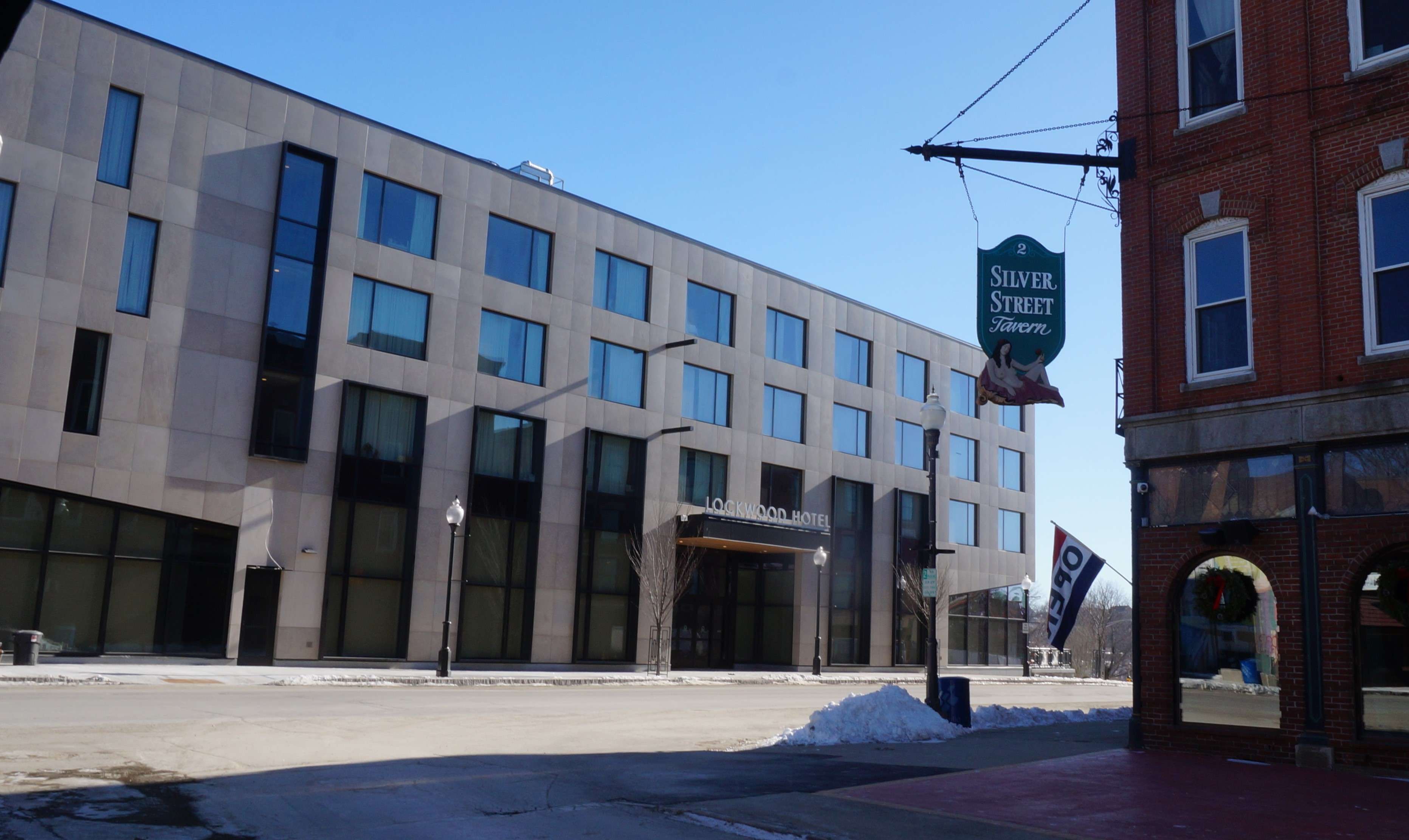
Shared development vision transforms downtown Waterville block
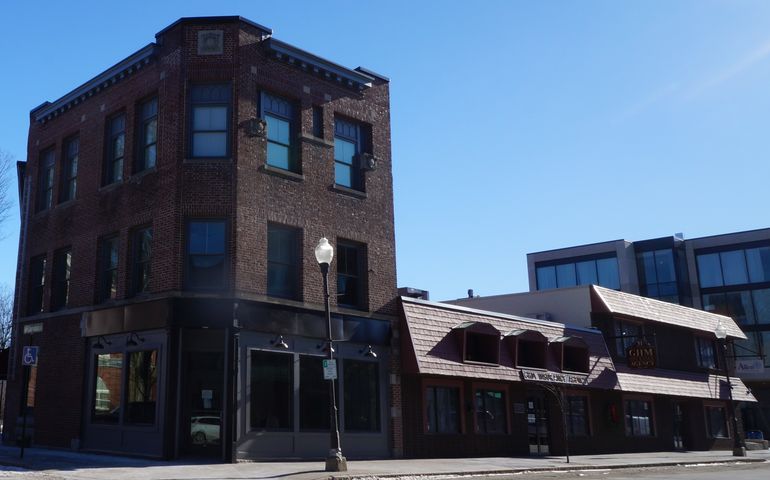 Photo / Maureen Milliken
Newly renovated 57 Main St. is Waterville developer Bill Mitchell's latest project, sharing a block with Colby College's soon-to-open Lockwood Hotel, seen here in the background.
Photo / Maureen Milliken
Newly renovated 57 Main St. is Waterville developer Bill Mitchell's latest project, sharing a block with Colby College's soon-to-open Lockwood Hotel, seen here in the background.
The renovation of a 110-year-old building on the corner of Common and Main streets in downtown Waterville is almost complete, transforming a former jewelry store into new retail space and two market-rate two-bedroom apartments.
The renovation by developer Bill Mitchell is itself notable — a beautiful adaptive reuse of one of downtown's landmark buildings. But it's just a piece of the whole-scale transformation of the southern end of Main Street in the last six years.
"I'm thrilled to be a small part of it," Michell told Mainebiz.
"It" includes the soon-to-be opened Lockwood Hotel, a Colby College project that will open later this year, two buildings away from Mitchell's new project. "It" also includes another Colby project in development, the Arts Collaborative at 14-20 Main St., across the street from the hotel.
On a grander scale, "it" includes Colby's Paul J. Schupf Art Center at 99 Main St., across Castonguay Square from Mitchell's new project.
Mitchell may see himself as a "small part," but he is no slouch when it comes to development in the area. His day job is owner of GHM Insurance, which is nestled between 57 Main and the Lockwood. In the past several years, while Colby has bought and developed half a dozen downtown properties, Mitchell, too has made a mark.
He owns and has renovated two other buildings on Common Street — 14-18 Common, home to the Proper Pig restaurant and bar, and 20-24 Common, between the Proper Pig building and his new project. That means he's redeveloped most of Common Street, a one-block street that borders the southern side of Castonguay Square.
And those are just his downtown projects. He's also in the process of renovating residential space on Park Avenue, north of downtown, and owns a variety of commercial developments across the city.

A common vision
Mitchell's family has lived in Waterville for generations, and his late father, Paul, who owned the insurance company was also a residential developer and the city's urban renewal director from 1966 to 1978.
Colby College, which moved out of downtown in the 1950s, in 2015 started a robust downtown development campaign after President David Greene met with city business owners and others, including Mitchell, to talk about how downtown that grow and be sustainable.
The college, which has invested $70 million in downtown development since then, and the insurance company owner and hometown boy have been working with the same shared vision since.
When Colby topped off the Lockwood project in November 2019, Mitchell was a featured speaker.
Mitchell said at the ceremony that, over the years, the city has come to the college’s aid. “And then times came when the community needed Colby’s help, and Colby stepped up, and this is one of those times,” he said.
He frequently cites "the vision" of Colby's Greene, and the Alfond family, for bringing Waterville back to life, including in an interview with Mainebiz late last month.
Colby officials also have good things to say about Mitchell. "It's transformational what Bill is doing downtown — not just downtown, but in the city," Brian Clark, Colby vice president of planning, told Mainebiz Wednesday.
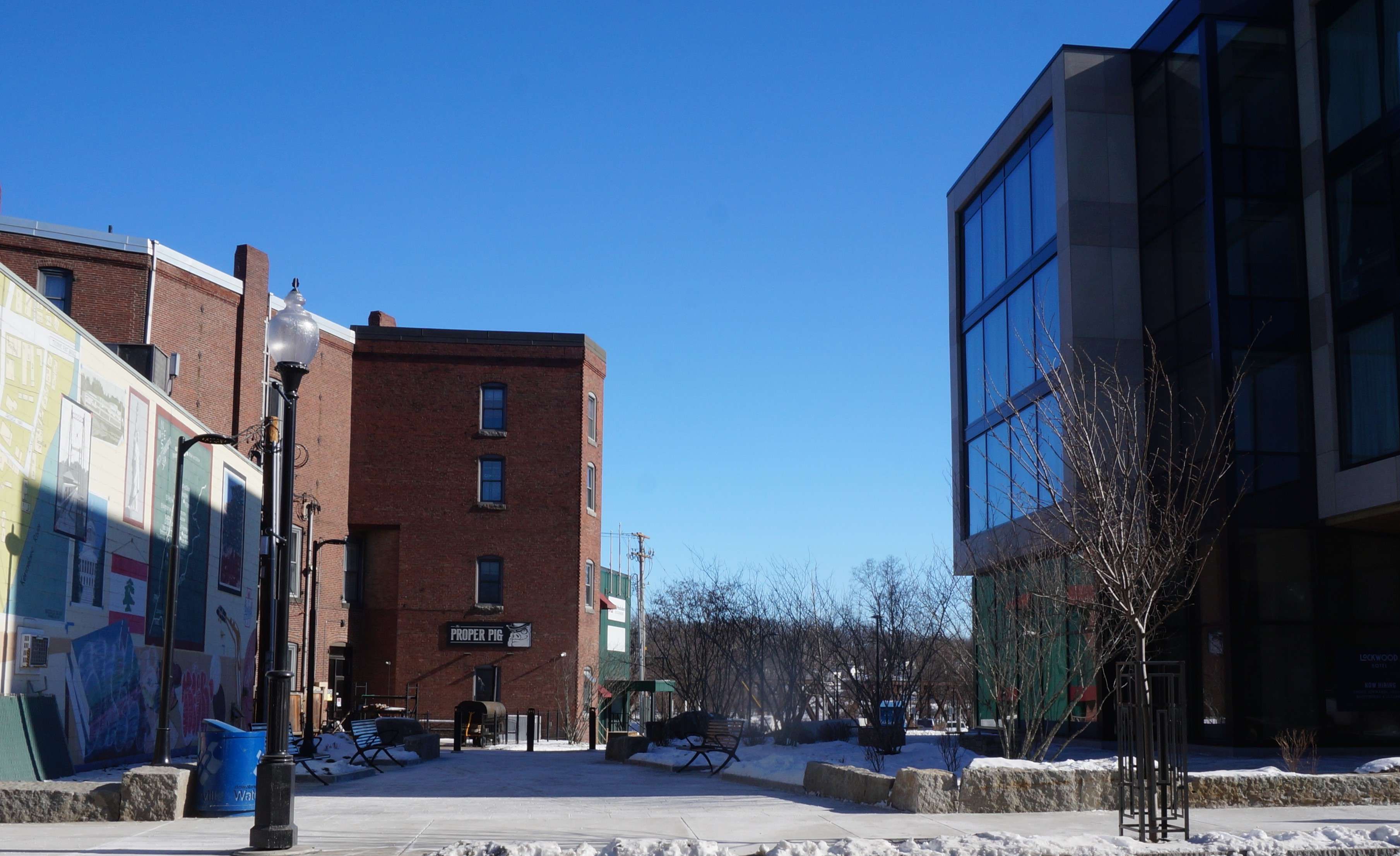
A whole different scene
What Mitchell and Colby are doing on one block is the absolute definition of transformational — almost every building on the block except for Mitchell's insurance company and 2 Silver St., on the corner of Main and Silver, next to the new arts collaborative, will be either new or totally renovated by the time 2021 ends.
Colby began its downtown projects in 2015, when it bought long-vacant 9 Main St., the former Levine's department store and 173 Main St, three blocks north.
Greene announced in 2016 that's the school would build a hotel on the Levine's site. In 2018, Colby bought the Camden National Bank building next door, at 33 Main St. Later that year, Camden moved into the new Bill and Joan Alfond Commons building at the north end of Main Street, and the Camden building was torn down to make more room for the Lockwood.
The Lockwood is expected to open in the fall. It's currently being used as student housing, and once the students leave for the year, Landry French will finish off the rooms.
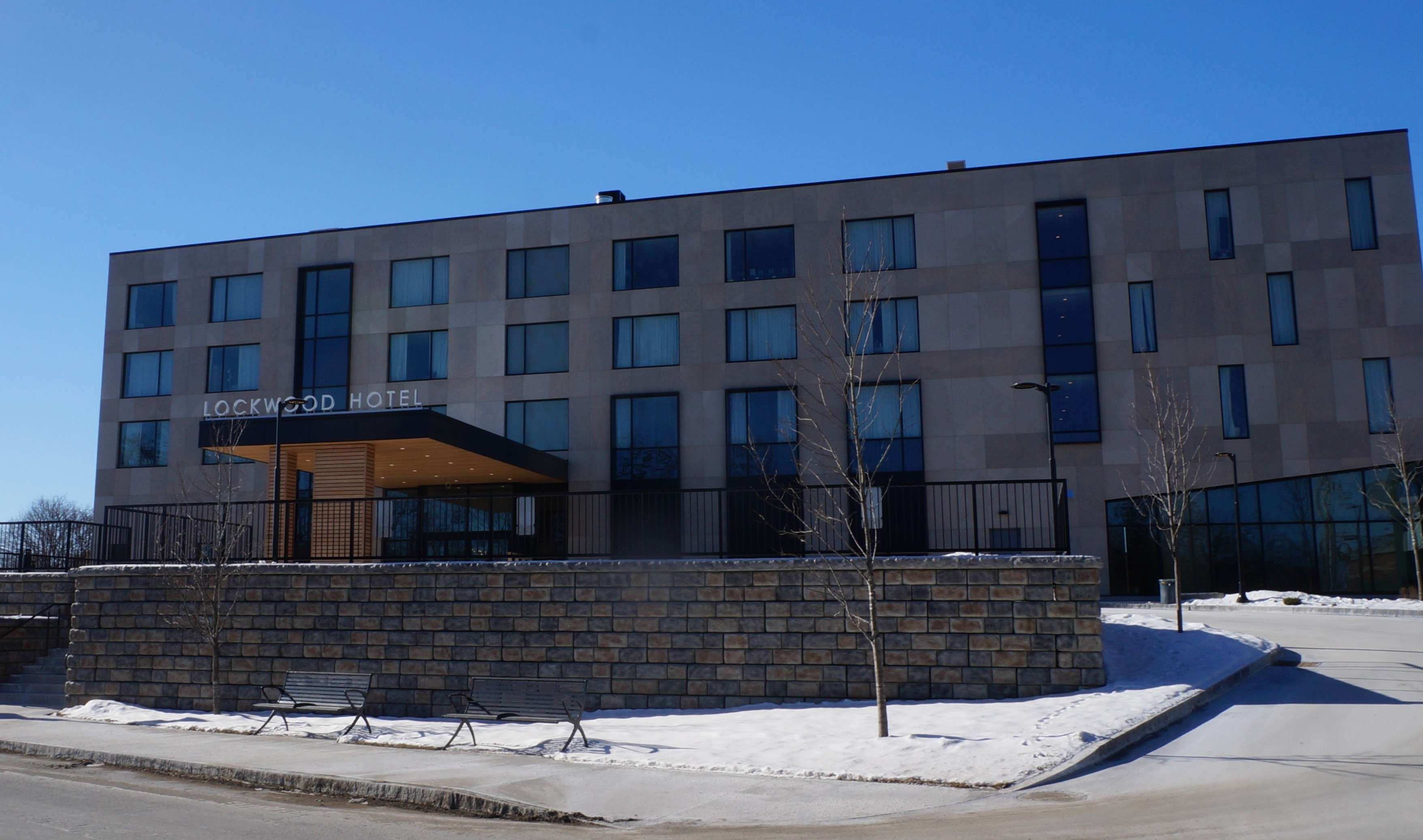
Outdoor dining and more
The restaurant, Front & Main, will open this spring, with outdoor dining in the pocket park on the north side of the hotel, adjacent to the back of Mitchell's property. Gas fire pits have been installed and it's also a complement to the Proper Pig's outdoor space, which abuts the park.
The park is across the street from the outdoor dining area on Silver Street for restaurants that include the Silver Street Tavern, the Last Unicorn and Cancun. "It connects with a really nice ribbon of outdoor dining," Clark said.
The hotel also has a southern terrace with glimpses of the nearby Kennebec River and overlooking the Lockwood Mill complex across Spring Street which is also being redeveloped.
A chef, Jesse Souza, has been hired for Front & Main, and hiring is also underway for the 30-person restaurant staff. Once the hotel is open, the property will have created 50 to 55 jobs, Clark said.
Parking for the hotel is on Front Street, across the street from its parking lot. The entrance on that side has drive-up access for checking in.
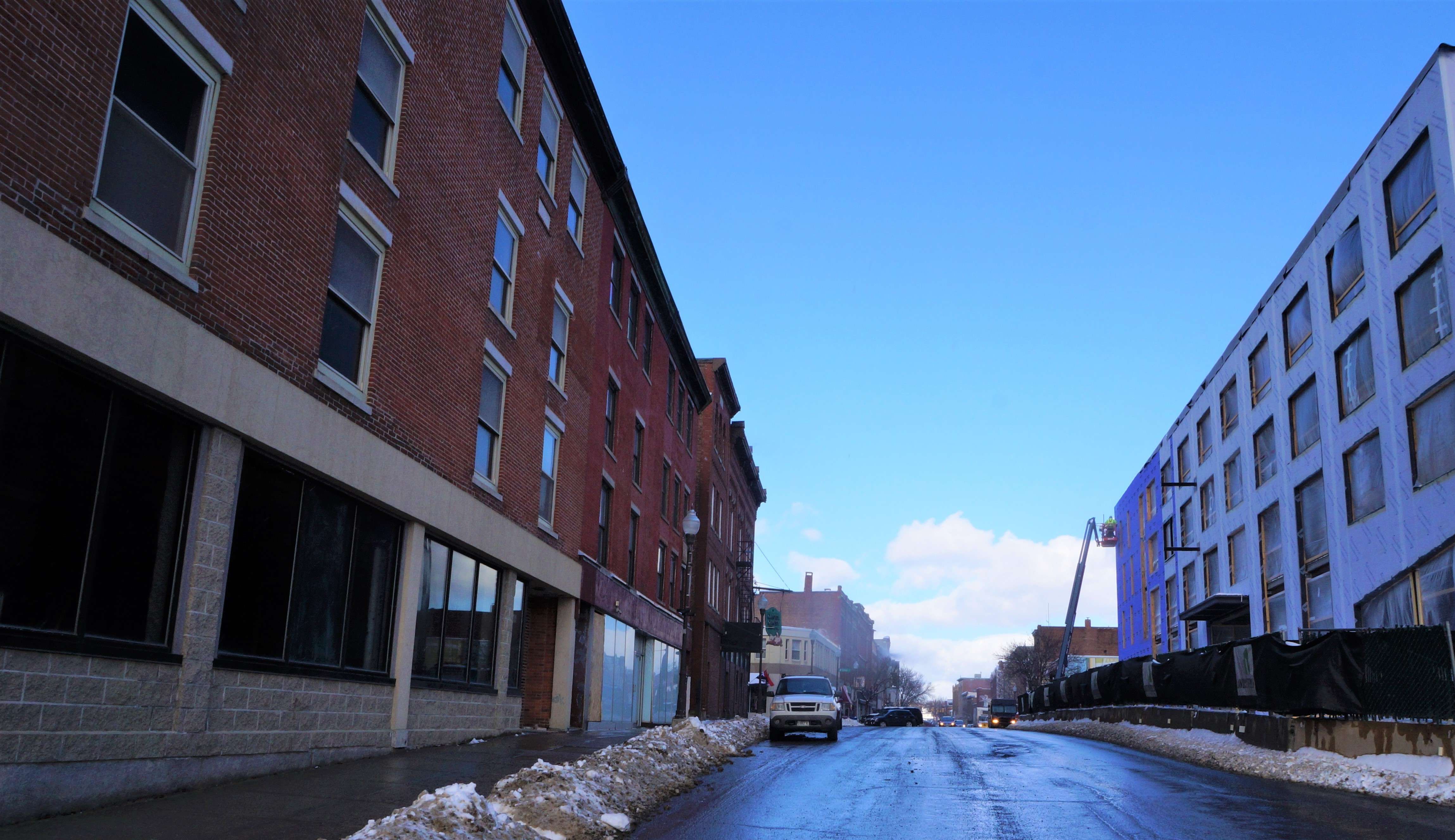
'Beautiful old challenging buildings'
Colby also bought the block of nearly 200-year-old connected buildings at 14-20 Main St. across the street. Ticonic Row, built in 1836, and part of the downtown historic district, was long empty and ravaged by two fires when Colby bought it for $274,00 in 2015. The college's development team struggled with whether to tear them down, briefly looked for a developer, and then early last year announced development of arts collaborative space in the building.
Clark said work is "progressing really well."
"They're really beautiful old challenging buildings to renovate," he said. Work has included shoring up the structure, new floors, new roofs and more. The work is being done by Landry French, another Colby Waterville partner. The Scarborough-based construction firm is building the Lockwood and built Alfond Commons.
Clark said the restored block, juxtaposed with the Lockwood directly across the street, "is emblematic of Waterville's past, present and future."
The building will have combined open space on the first floor, with movable walls, seats and risers, and will be used by the community to engage with art. The second and third floors will have flexible artist studio and maker spaces, which are being designed to support established and emerging artists. In the near term, the fourth floor will house the Lunder Institute for American Art staff and affiliates, and also be a central convening location for scholars and researchers.
Clark said the building is on schedule to open in April, with a likely grand opening in the fall, if people can gather more comfortably by then.
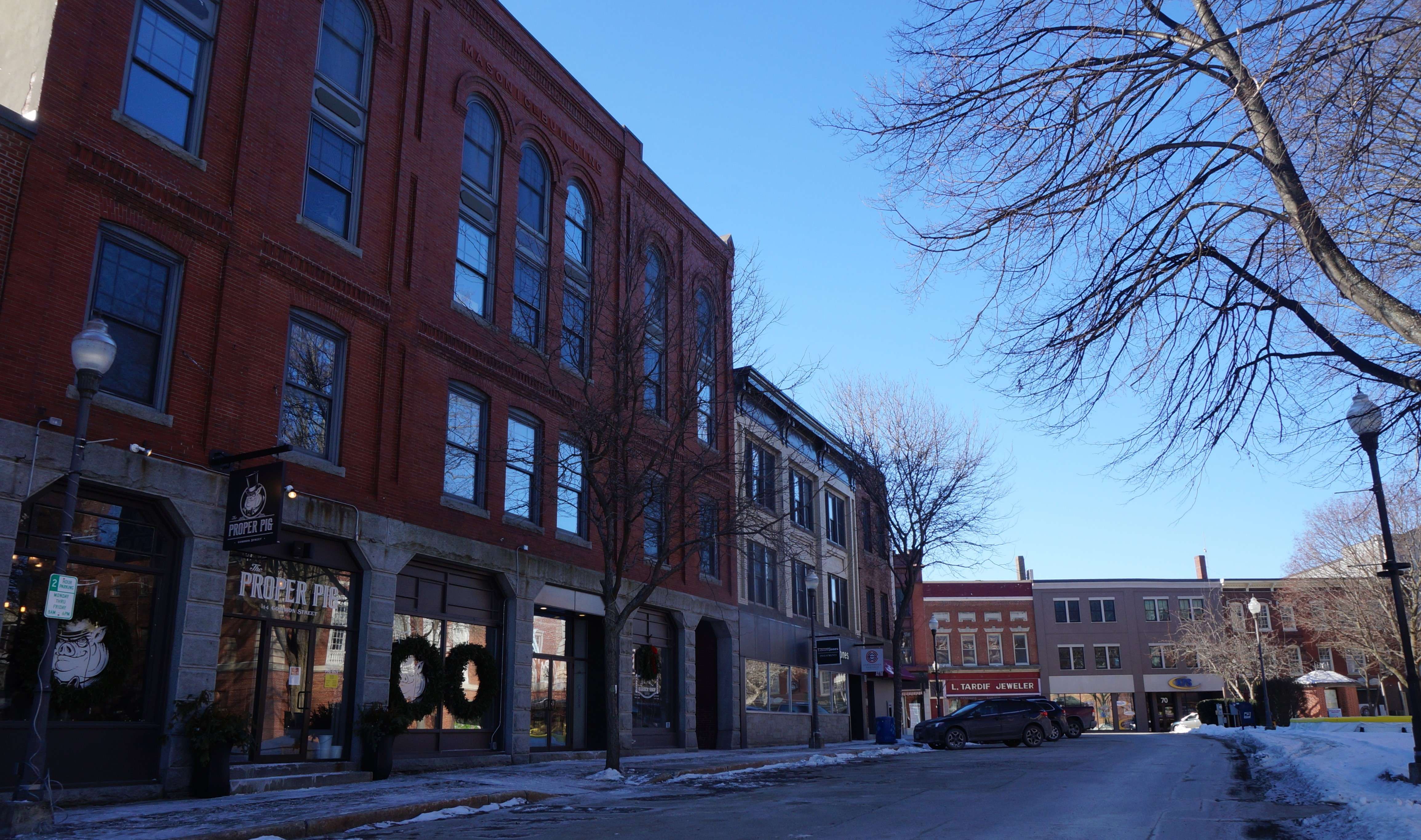
A prestige location
At 57 Main St., Mitchell's new development, the top-to-bottom complete renovation, and extensive exterior upgrades are finished.
"It's such a beautiful building," Mitchell said. "And it's such a prestige location."
Built in 1912 by Arlington Wolman as a tobacco shop, it was most recently Larsen's Jewelry. Elm City Nutrition will open in the ground floor retail space this spring. The two two-bedroom 1,200-square-foot market-rate apartments already have tenants.
Mitchell is looking forward to the renovation of 99 Main St., across Castonguay Square, which Clark said will begin this year. The building, in partnership with Waterville Creates! is being developed into a $20 million art gallery, new entrance for the connected Waterville Opera House, and more.
"Those are just very exciting projects," Mitchell said.
Clark said that once the $20 million Schupf arts center is open, with an atrium that opens onto Castonguay Square, the square will be more of a "town green space."
Another thing Mitchell and Clark agree on — the post-pandemic picture in Waterville looks good.
When Colby and downtown business leaders, including Mitchell, began to meet seven years ago to talk about the city's development, creating a sustainable foundation that could weather anything that came, was part of the conversation.
"No one was thinking about a pandemic," Clark said. But the plan is still working. Several area businesses have moved to the area or are growing, creating jobs. Development is taking place all over the city, by a variety of residents and developers.
Bringing older buildings back to life, building new ones, and all the activity that spurs "puts us in a position of strength," he said. He predicts the city will come back even stronger than it had been before 2020.
Mitchell agreed. While the pandemic has brought many challenges to residents and businesses, he said "we'll get past it."
"I'm excited," he said. "The future is still very bright."














0 Comments